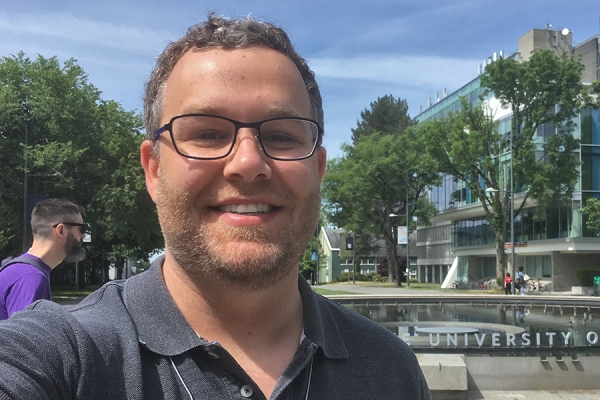 PhD candidate Brandon Sabourin plans to use a survey to identify the educational development needs of sessional instructors.
PhD candidate Brandon Sabourin plans to use a survey to identify the educational development needs of sessional instructors.
Brandon Sabourin, a doctoral candidate in the Faculty of Education, hopes his research will support the development of sessional instructors like himself.
“When I began teaching as a sessional instructor in the Faculty of Education, I tried to engage in as many workshops, courses, and conversations about effective teaching as I could,” he says. “I wanted both to improve my teaching and be a part of the growing community of people working to provide UWindsor students with the best learning experiences.”
His dissertation, funded by a grant from the Educational Developers Caucus, is designed to explore the specific educational development needs of UWindsor sessional instructors in relation to the approaches to and beliefs about teaching.
“There are many sessionals on our campus who want to develop as educators but for many reasons, some haven’t found the right opportunity yet,” Sabourin says.
His recent systematic literature review published in the International Journal for Academic Development found that across 27 North American studies on sessional instructors’ educational development needs, respondents highly valued opportunities for teaching development and connections to institutional and departmental teaching culture, in contrast to the standard administrative onboarding typically received. Specifically, sessional instructors who teach on contract course-by-course may face additional barriers to educational development and require different support based on their teaching environment.
Currently, departments — including the Centre for Teaching and Learning and the Office of Open Learning — provide educational development: a term used to describe programs promoting effective teaching and learning. At UWindsor, sessional instructors are able to take part in nearly all educational development opportunities, but targeted support requires understanding sessionals’ needs.
Sabourin, who also works as an educational developer in Red River College Polytechnic’s Centre for Learning and Program Excellence, has seen the impact educational development can have across an institution.
“At Red River College, teaching development is especially important because of the applied focus of many of our programs,” he says. “Targeted educational development opportunities for part-time faculty appears to be resulting in more authentic teaching and more engaged students across campus.”
For the next phase of his research, Sabourin invites current or former UWindsor sessional instructors to participate in an online survey, interview, or both. Participants will be offered entry into a draw for one of four $50 gift cards, and interviewees will receive a $25 gift card.
Additionally, he invites all current and former deans, associate deans, school directors, and department heads to complete a short online survey to help identify the educational development needs of sessional instructors at the faculty or department level.
In both instances, “former” is restricted to those who were last active no further back than January 2018.
The study has been approved by the UWindsor Research Ethics Board. For more information, visit https://bit.ly/UWinSessDev.
